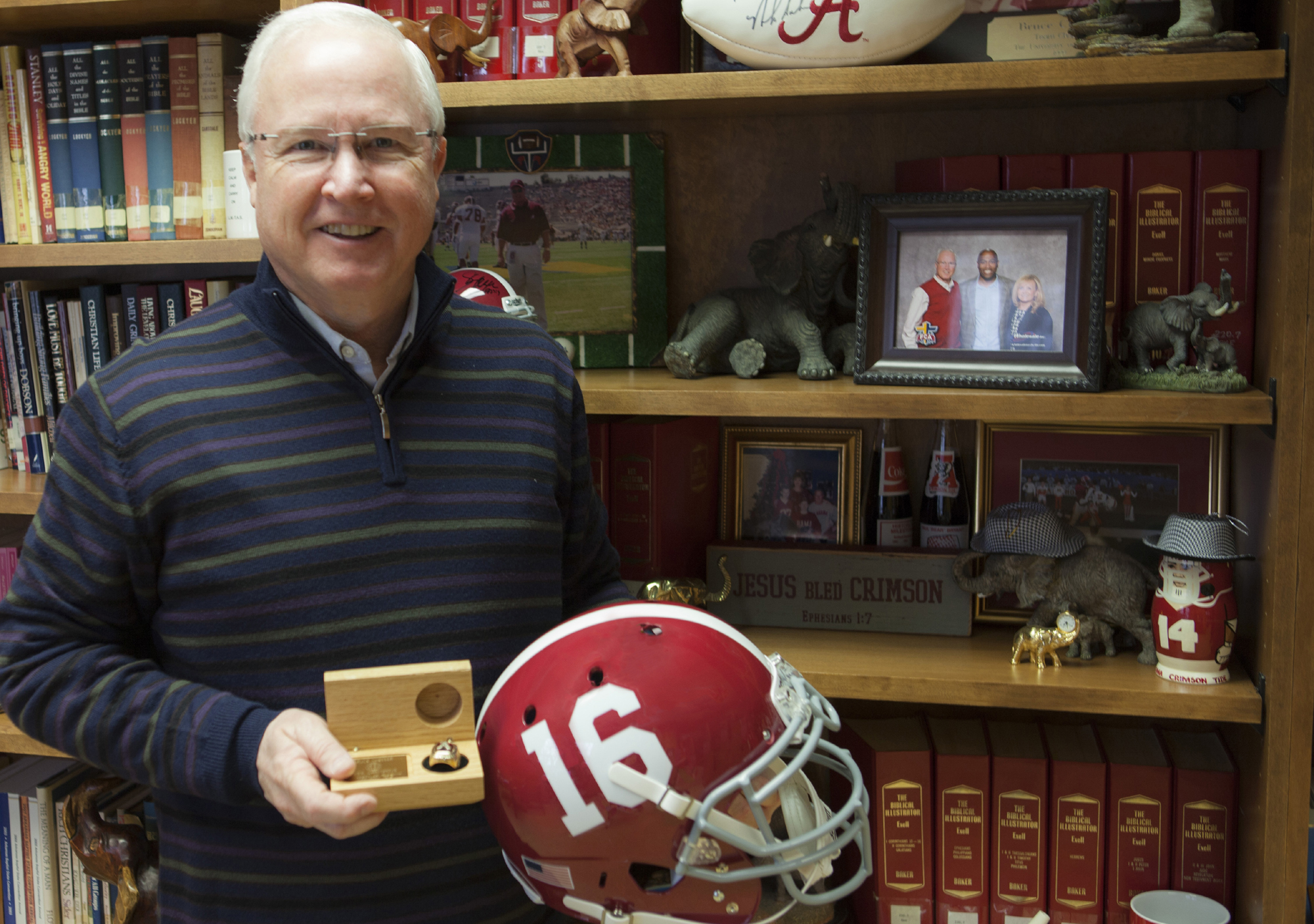
[SLIDESHOW=44130,44131,44132]TAMPA, Fla. (BP) — Six seasons as chaplain of the University of Alabama football team give pastor Bruce Chesser a unique perspective on the Jan. 9 College Football Playoff title game between Alabama and Clemson University.
The uniqueness, however, isn’t the strength of his allegiance to the Crimson Tide — though his office does feature a sign that reads “Jesus bled crimson.” What’s unique for Chesser, pastor of First Baptist Church in Hendersonville, Tenn., is the way he thinks about the players on both sidelines.
The athletes at Alabama and Clemson, Chesser told Baptist Press, are “very talented” and “very large.” But “they are at the same stage of life in most things as your teenagers.”
Gaining that perspective helped Chesser build relationships with players and even play a role in some of their journeys to faith in Christ during his tenure as Alabama’s chaplain from 1997-2003.
Before serving as Alabama’s chaplain, “I had watched college football the same way you would watch professional football,” Chesser said. “They were just men on television.”
But walking with players through personal struggles, traveling with them and leading them in chapel services changed his thinking.
I realized “these are just really, really big teenagers and 20- or 21-year-olds,” Chesser said. “They were doing the same things that my boys were doing. They were talking about PlayStation and Xbox and their girlfriends.”
‘They all called me the chaplain’
The chaplaincy opportunity arose when Chesser pastored Calvary Baptist Church in Tuscaloosa, Ala., where some Alabama players and coaches were members.
“I was asked to do a chapel service for the team before one of the games,” Chesser said. “One led to another, and before long I was traveling with the team and was kind of their ex officio chaplain.”
Chesser “never was listed in the program or on the website” as chaplain, he said. But “they all called me the chaplain. I got a ring when we won a [Southeastern Conference] championship” in 1999.
During football season, Chesser attended practice most days and made himself available in the training and locker rooms in case players needed to talk about issues ranging from relational difficulties to family deaths and spiritual concerns. On game days, he led chapel services at the team hotel — both at home and on the road — then stood on the sidelines during the game.
“When I see some of [the players], they still kind of treat me as a former pastor,” Chesser said.
Coaches
At times, Chesser’s ministry included coaches. After a period of personal struggles, one coach “really became a devoted follower of Christ,” Chesser said. Another coach and several assistants were members at Calvary, where Chesser pastored.
Though major college coaches gain money and prestige, Chesser said, they also face personal strains that necessitate Christian friendship and ministry.
“Particularly back in the dark ages when Alabama was losing a lot of games,” Chesser said, coaches’ children “would get sick before they had to go to school because they knew the ridicule they were going to take when they got to school because the team had lost a ballgame.”
‘Real life lessons’
Though Chesser’s chaplaincy ended when he left Calvary Baptist in 2003, he has continued to watch college football with heightened spiritual sensitivity toward players and coaches.
It bothers him when fans call a player names “because he missed a catch or he missed a kick,” and when fans call for a coach’s firing without thinking about his family.
Chesser urges fellow football lovers to approach the national championship game with a similar perspective.
“These kids want it more than anybody in the stands,” Chesser said. “And they are trying harder than any of us can comprehend … To be yelled at because they missed a kick or fumbled the ball is really an indictment on the person” doing the yelling.
In the title game, “Clemson has got some great spiritual leaders on their team; Alabama has got some great spiritual leaders on their team. In the final analysis, who wins the game is not the most important thing. There are some real life lessons these guys are learning.”

















